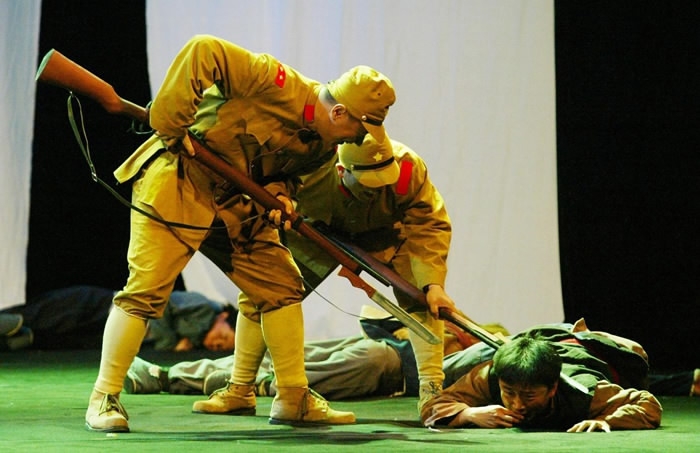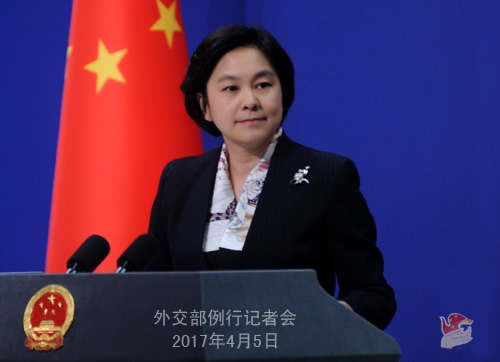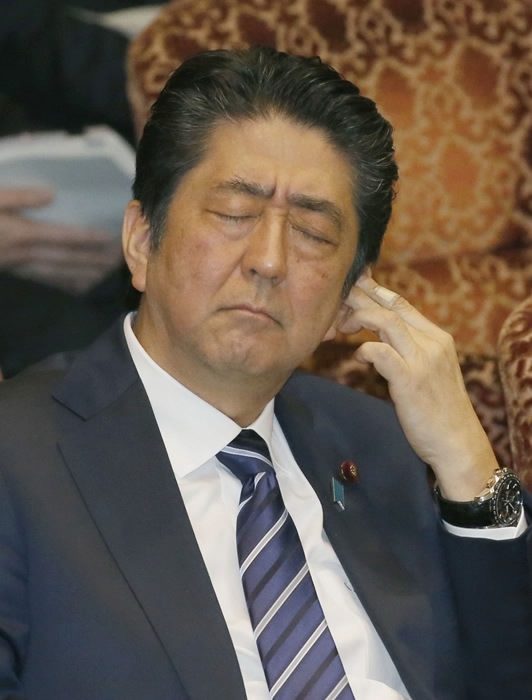Japan should not mislead its citizens with wrong perspectives of its wartime history and should guard against the revival of militarism, a spokesperson of the Chinese foreign ministry said at a press conference in Beijing on Wednesday, in response to a recent move by the Japanese government to add a highly controversial course of bayoneting to secondary school education.
There are concerns that bayonet fighting, a training item for the Japanese Imperial Army before and during World War II, could revive nostalgia for militarism among students.

A drama staged in Beijing on April 30, 2005 shows two Japanese soldiers point their bayonets against a Chinese man in 1942 during World War II. /CFP Photo
Meanwhile, the Japanese cabinet decided last week that the ultra-nationalistic Imperial Rescript on Education should not be "totally rejected" as teaching material, causing widespread condemnation from opposition parties.
Hua Chunying, spokesperson of China's Ministry of Foreign Affairs, said Japan's military aggression in the past had brought enormous suffering to people in China and other Asian countries and let to "complete failure" of Japan itself, which had offered "profound historic lessons."
"Now as Japan attempts to reinstate its wartime educational doctrines and training item, people have to ask if Japan is trying to turn back the wheel of history and revive its militarism," Hua added.

Hua Chunying, spokesperson of China's Ministry of Foreign Affairs, speaks at a press conference in Beijing on April 5, 2017. /FMPRC.gov.cn Photo
She urged the Japanese government to face up to its history of aggression and learn from the historic lessons, warning it against misleading the Japanese people with wrong perspectives of history and "leading Japan in the dangerous direction of militarism again."
Prime Minister Shinzo Abe's administration is under criticism from Japanese lawmakers for its recent moves. Ichiro Ozawa, a veteran politician and president of the Liberal Party, said allowing the use of the imperial rescript "could be consistent with Prime Minister Shinzo Abe's beliefs," according to a Kyodo News report.
A lawmaker from the Japanese Communist Party slammed the Abe administration for attempting to return to the prewar era.

Japanese Prime Minister Shinzo Abe grimaces while listening to a question during a House of Councilors committee session in Tokyo, Japan on March 27, 2017. /CFP Photo
In the 315-word imperial rescript, issued in 1890 under the name of Emperor Meiji, the Japanese population are referred to as "subjects" of the emperor and are called on to "offer themselves courageously to the state and the imperial throne "when an emergency arises."
Besides, the Japanese prime minister and his wife Akie Abe are under pressure for their alleged roles in a scandal involving private school operator Moritomo Gakuen, which purchased a plot from the state for a far cheaper price than the appraise value.
Moritomo Gakuen head Yasunori Kagoike claimed that he had received an envelope containing one million yen (about 9,000 US dollars) as a secret donation from Akie, who faces calls from the opposition to testify in the Diet.

CGTN Graphic
Abe has repeatedly denied any involvement by himself, his wife or members of his administration.
The ultra-nationalistic school operator also caused controversy for making its pupils recite the imperial rescript.
Related stories:









